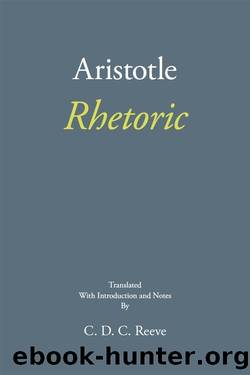Rhetoric (The New Hackett Aristotle) by Aristotle & C. D. C. Reeve

Author:Aristotle & C. D. C. Reeve [Reeve, C. D. C.]
Language: eng
Format: epub
Publisher: Hackett Publishing Company, Inc.
Published: 2018-09-03T04:00:00+00:00
In ethical or political contexts, which are particularly relevant to rhetoric, the canonical application of kalon is to ends that are intrinsically choiceworthy and intrinsically commendable or praiseworthy (epaineton)ââOf all goods, the ends are those choiceworthy for their own sake. Of these, in turn, the kalon ones are all those praiseworthy because of themselvesâ (EE VIII 3 1248b18â20; also NE I 13 1103a9â10)âand that, as such, are contrasted with things that are compulsory. In the same way, what is ethically kalon is contrasted with what is compulsory: âwe should be courageous not because of compulsion, but because it is nobleâ (NE III 8 1116b2â4). It is because ethically kalon actions are intrinsically choiceworthy ends, indeed, that a good person can do virtuous actions because of themselves (II 4 1105a32) and for the sake of what is kalon (III 7 1115b12â13). What makes such actions choiceworthy (VI 1 1138a18â20) and praiseworthy (II 6 1106b24â27), however, is that they exhibit the sort of order (X 9 1180a14â18), proportionality (II 2 1104a18), and determinateness (II 6 1106b29â30, IX 9 1170a19â24) that consists in lying in a mean (meson) between two extremes. This brings us full circle, connecting what is ethically kalon to what is aesthetically noble, lending the former too an aesthetic tinge.
Finally, what is ethically kalon includes an element of self-sacrifice that recommends ânobility,â in its more ethical sense, as a good equivalent for it as well: âIt is true of an excellent person too that he does many actions for the sake of his friends and his fatherland, even dying for them if need be. For he will give up wealth, honors, and fought-about goods generally, in keeping for himself what is kalonâ (IX 8 1169a18â22). One reason people praise a kalon agent, indeed, is that his actions benefit them: âIt is necessary, though, for the greatest virtues to be those that are most useful to others, if indeed virtue is a capacity productive of benefaction. Because of this, people most honor the just and the courageous, since courage is useful to others in war, and justice both in war and in peaceâ (Rh. I 9 1366b3â7). But since what is kalon is a greater good than those an excellent person gives up or confers on others, there is also a strong element of self-interest in what he does: âThe greater good, then, he allocates to himselfâ (NE IX 8 1169a28â29). An excellent person does kalon actions for their own sake, not for an ulterior motive, because it is only as done in that way that they constitute the doing well in action (eupraxia) that just is happiness. An account of kalon tailored to rhetoric is given at Rh. I 9 1366a33â36.
{184} Note 92
But often they give no thought to [showing] it not unjust to enslave neighbors: Reading οá½Îº á¼Î´Î¹ÎºÎ¿Î½ with Kassel, Grimaldi; OCT secludes οá½Îº. The idea is that in advising a course of action, they do nothing to address the injustice involved.
Note 93
They praise Achilles because he went to
Download
This site does not store any files on its server. We only index and link to content provided by other sites. Please contact the content providers to delete copyright contents if any and email us, we'll remove relevant links or contents immediately.
Cecilia; Or, Memoirs of an Heiress — Volume 1 by Fanny Burney(32536)
Cecilia; Or, Memoirs of an Heiress — Volume 2 by Fanny Burney(31934)
Cecilia; Or, Memoirs of an Heiress — Volume 3 by Fanny Burney(31925)
The Lost Art of Listening by Michael P. Nichols(7485)
Asking the Right Questions: A Guide to Critical Thinking by M. Neil Browne & Stuart M. Keeley(5751)
We Need to Talk by Celeste Headlee(5604)
On Writing A Memoir of the Craft by Stephen King(4924)
Dialogue by Robert McKee(4385)
Pre-Suasion: A Revolutionary Way to Influence and Persuade by Robert Cialdini(4208)
I Have Something to Say: Mastering the Art of Public Speaking in an Age of Disconnection by John Bowe(3871)
Elements of Style 2017 by Richard De A'Morelli(3336)
The Book of Human Emotions by Tiffany Watt Smith(3289)
Fluent Forever: How to Learn Any Language Fast and Never Forget It by Gabriel Wyner(3071)
Name Book, The: Over 10,000 Names--Their Meanings, Origins, and Spiritual Significance by Astoria Dorothy(2967)
Why I Write by George Orwell(2944)
Good Humor, Bad Taste: A Sociology of the Joke by Kuipers Giselinde(2939)
The Art Of Deception by Kevin Mitnick(2785)
The Grammaring Guide to English Grammar with Exercises by Péter Simon(2733)
Ancient Worlds by Michael Scott(2673)
